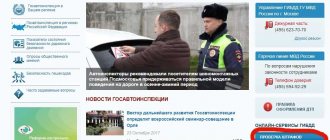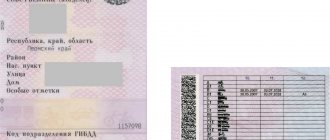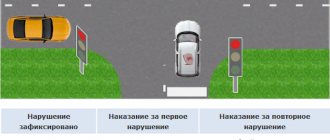There are fines for violating traffic rules. If a citizen has violated existing norms, he is obliged to pay a monetary penalty in the prescribed amount. The presence of fines encourages the driver to comply with existing standards. Payment of monetary penalties for traffic violations is a mandatory requirement. A person cannot refuse to repay them. If the vehicle owner does not pay off the debt within the specified time, additional sanctions will be applied to the traffic rule violator. In addition, bailiffs will collect the debt from the driver.
Consequences of non-payment
If a citizen refuses to pay fines imposed for violating traffic rules, additional punishment may be applied to him. The violator can expect the following consequences:
Attention! If you have any questions, you can chat for free with a lawyer at the bottom of the screen or call Moscow; Saint Petersburg; Free call for all of Russia.
- arrest for 15 days;
- involvement in compulsory work for up to 120 hours.
If the total amount of penalties exceeds 10,000 rubles, the driver may be deprived of his right to drive a vehicle. The validity of the certificate in this situation is suspended by court order. You will be able to get your driving license back only after the debt has been fully repaid.
If the driver continues to ignore the need to pay off the debt, enforcement proceedings may be initiated by the bailiffs. Its result will be the issuance of a writ of execution, allowing the debt to be collected under a traffic police fine forcibly.
How to terminate enforcement proceedings?
So that the bailiffs can find out about the payment of the traffic fine in the shortest possible time and stop enforcement proceedings, it is better to report the repayment of the debt yourself. This can be done by providing a receipt or other official payment information.
If this is not done, information about payment will in any case be sent to the FSSP, but due to the high workload of employees, the process of terminating enforcement proceedings may be delayed. This threatens with various methods of influence from government agencies.
When can bailiffs collect a traffic fine?
Collection of traffic police fines by bailiffs forcibly begins if a person ignores the need to pay them within 2 months from the date of receipt of the order. According to the rules, it comes into force after 10 days have passed from the moment it was provided to the violator. This period is allocated so that a citizen can go to court and appeal the traffic police decision.
A citizen has the right to a deferment. It is provided if a person knows that he will not have time to pay the fine within the period established by law. In order for the state to cooperate, it is necessary to draw up a statement. Installments are available for 1 or 3 months.
If the driver has not started the procedure for appealing the traffic police fine or has not asked for an additional period to repay the debt, the case is transferred to the Federal Bailiff Service. They will begin collecting fines by force.
Where is it better to pay the fine: the traffic police or the FSSP?
The question of how to properly pay a traffic fine through bailiffs is asked by many car owners. Will it be relevant to use a receipt from the traffic police or is it necessary to obtain payment details from representatives of the FSSP?
There is no clear answer to this question, which is due to the imperfect operation of the system and gaps in the exchange of information between the FSSP and the traffic police. Practice shows that the optimal solution is to pay bailiffs. By paying off the debt and notifying them, you can avoid further difficulties.
Despite the fact that bailiffs act as intermediaries in the collection of fines, it is best to use the information received from them for payment. If you use information previously obtained from a traffic police receipt for this, you may encounter the fact that the data will not be immediately transferred to the FSSP. This may mean re-writing the fine from the bank card, and other measures that we discussed earlier.
Collection procedure
The process of collecting traffic fines can be divided into two stages. At the first of them, the bailiffs pass the order. The document records information about the violation and the amount of the penalty. Typically, the document reaches the bailiff service within 10 days from the date of its execution.
If the debtor does not comply with the requirements imposed on him by the court, the second stage begins. Representatives of the FSSP collect the debt forcibly. To do this, the property that belongs to the non-payer of the fine is seized and subsequently sold.
What if the bailiffs wrote off the fine twice?
There is an explanation on this matter on the FSSP website. In short: if the bailiffs debited money from the account for the second time, most likely the bank did not transmit the payment data to the GIS GMP.
Get a receipt from the bank. The driver must obtain a payment receipt from the bank.
Collect documents. Take with you receipts for payment of both fines: from the traffic police and the FSSP. You will also need copies of the payment receipt and a certificate stating that there are no unpaid traffic fines.
Submit a complaint. Bailiffs accept complaints in writing. The name and telephone number of the bailiff are indicated on the order. If you don’t have a resolution, contact the regional bailiff service.
If the money is not returned or continues to be written off, complain to the bailiff. A citizen has the right to write a statement so that the FSSP checks the actions of a particular bailiff.
Collection of administrative fines
According to the rules, a citizen is obliged to pay off an administrative fine no later than 60 days from the date of entry into force of the decision on its imposition. If a person has asked for a deferment, the debt must be repaid 2 days before its completion. If the transfer of funds has not been made, additional punishment will be applied to the citizen by bailiffs.
According to Art. No. 20.25 of the Code of Administrative Offenses of the Russian Federation, if this happened, the amount of the penalty will increase by 2 times or the citizen will be subject to administrative arrest for up to 15 days. In a number of situations, the punishment can be modified by engaging in compulsory labor for up to 50 hours.
If a violation of the established deadlines is detected, the bailiff will begin drawing up a protocol on the administrative offense. Then there is accountability. The court has 3 months to call the citizen to account.
Responsibility periods may vary. So, if the last day of voluntary debt repayment falls on a holiday or weekend, the period is transferred to the first working day following it. For this reason, experts advise independently calculating the time period during which a person has the right to make settlements with the state without imposing additional sanctions.
Representatives of the FSSP actively interact with other government bodies and services. This allows bailiffs to have an effective impact on persons who evade paying fines. Therefore, experts advise not to hide, but to make contact with government officials and try to resolve the current situation.
Forced collection of traffic police fines by bailiffs
Forcible collection of traffic police fines by bailiffs is carried out against persons who refuse to repay the resulting debt in a timely manner. If such a situation occurs, the GIS database receives information about non-payment of the fine. Persons with appropriate authority apply to the court that issued the monetary penalty order. A copy of the document is sent to the FSSP.
Having received the document, the bailiff initiates enforcement proceedings. The debtor will be notified of this. Having received the information, the driver has 5 more days to voluntarily cancel his obligations under the traffic police fine. If he pays off the debt during this period, enforcement proceedings will cease. However, the debtor will not be able to avoid paying a mandatory monetary fee, the amount of which is 7% of the amount of the debt, but not less than 1000 rubles.
If more than two years have passed, it will not be possible to collect such debt. However, until the deadline has expired, the debtor has the right to force him to fulfill his obligations. If the Federal Bailiff Service begins work against a citizen, the traffic police fine will be collected forcibly. To do this, property will be confiscated from traffic violators. Bailiffs have the right to confiscate funds, securities, and wages of the debtor. If the amount of debt exceeds 10,000 rubles, the citizen may be restricted from traveling outside of Russia. In addition, the driver's license is temporarily withdrawn. All actions that bailiffs will perform against the debtor are notified by mail.
To avoid additional sanctions, it is worth paying off traffic police fines in a timely manner. The system does not always work quickly. There are cases when paid fines continue to hang as if they had not been repaid. To prove the case to the bailiffs, the citizen will have to provide a receipt. Therefore, experts advise keeping documentation confirming the fact of debt repayment.
How to appeal an illegal fine?
You can appeal a fine within 10 days from the date of its imposition. If the deadline has been missed, the motorist has the right to apply for an extension of the application period. However, the request will only be granted if there are compelling reasons for such action. To appeal a traffic police decision, a person can contact the management of the executors or file an application in court.
The first method allows you to significantly speed up the procedure. To perform the action, you will need to contact directly the head of the enforcement agency, senior or chief bailiff. By choosing this method, a person will not have to pay the state fee. A response to a complaint will be made within 10 days.
The second method involves a standard trial. The method is considered the most effective, but requires increased labor costs. Copies of the decision must be provided to the claimant of the property, the debtor and the bailiff.
Application for appeal
The outcome of solving the problem largely depends on the quality of the application drawn up to appeal the illegal collection of a traffic police fine by bailiffs. Therefore, its preparation must be approached responsibly. The application should include the following information:
- The name and address of the institution to which the citizen applies. The information should be reflected in the application header. Below is information about the debtor and the applicant. Next, you need to provide information about the relatively interested person - the bailiff who executed the traffic police resolution.
- Title of the paper. It can be called a complaint or a statement about illegal actions or inaction of a bailiff. Experts advise using the second option.
- Fill out the body of the document. In it, experts advise to reflect information about the decision made by the bailiff, the date and place of seizure of property and the circumstances under which the decision was executed.
- Links to specific provisions of current legislation. You should approach this point carefully. The citizen must try to prove that the bailiff actually committed illegal manipulation with the traffic police fine. In addition, experts advise recording the consequences that resulted from the decision made.
- Ask to cancel the completed action. At the end there is a date and signature.
Additional documents must be attached to the documents. It is recommended to include in the list:
- a check filled out in accordance with the application rules confirming the fact of payment of the state duty;
- decision of the bailiffs who enforced the collection of the traffic police fine;
- other documents that allow you to get an idea of the applicant’s correctness.
Sample complaint to court
Sample complaint in order of subordination
Sample bailiff's act on seizure of property
Sample resolution to seize property
Sample order of a bailiff on the transfer of seized property to auction
Nuances
Experts advise not to let bailiffs collect a fine from the traffic police. If a citizen has violated traffic rules, it is worth making a payment as quickly as possible. It must be remembered that discounts are provided in the first 20 days after receiving the resolution. According to Art. No. 32.2 of the Code of Administrative Offenses of the Russian Federation, during this period those fined have the right to pay only 50% of the penalty amount.
If a traffic violation violator has ignored the need to pay off the debt on the traffic police fine for 2 months, he must be prepared for a visit from the bailiffs. However, we must remember that they have the right to act only within the framework of the law. Exceeding authority is a violation. If such a fact occurred, it is worth contacting the relevant government agency.
Funds can only be recovered within the amount of the debt. It usually includes:
- traffic police fine;
- remuneration for the work of FSSP representatives;
- sanctions, monetary penalties applied for violation of the debt repayment period;
- other penalties provided for by current legislation.
The bailiff has no right to demand funds in excess of this amount.
Enforcement proceedings and its procedure
If the driver does not pay off the debt for traffic violations on time and does not submit an application for deferred collection, enforcement proceedings are opened on traffic police fines. A traffic police officer can initiate a case of non-payment.
In the future, debt collection will be handled by a structure such as the Federal Bailiff Service. Its representatives act in accordance with.
First of all, a resolution is issued to initiate enforcement proceedings and a traffic fine is sent to the debtor. The resolution comes into force ten days after its execution.
Only two months are given to repay the debt, and this period begins from the moment the order was served.
If during this time the violator has not filed a statement of disagreement with the fine and has not contributed funds to the treasury, the bailiffs will look for ways to collect them.
There are cases when drivers do not pay, but their debts are cancelled.
- The procedure for collecting traffic police fines by bailiffs is such that they can act only after a decision has been issued. If two months have passed since the violation and no resolution has been issued, the period for bringing to justice is considered to have expired and you don’t have to worry about penalties (Article 4.5 of the Code of Administrative Offenses of the Russian Federation).
- When the driver cannot repay the debt within two months, he has the right to submit an application requesting a deferment or installment payment, attaching documents about his financial situation. To do this, you must submit an application to the authority that issued the decision. If there is no such document and the driver does not intend to appeal the protocol, his case is transferred to the FSSP.
Letter of initiation of proceedings
After the initiation of proceedings, a letter will be sent to the debtor within three days. And here many drivers have a question: what to do if you receive a letter from the bailiffs for a traffic police fine? First of all, you should read it carefully and find out how many days are given for voluntary repayment of the debt. As a rule, five days are allocated for this.
You can determine the date from which this time is counted by the number indicated on the envelope. To avoid complicating the situation, you should pay the collection amount yourself. Otherwise, the executive service will take appropriate measures.
Bailiffs can deduct the amount of the traffic police fine from your earnings. If a citizen does not have an official job, he needs to be prepared that after receiving the letter, bailiffs may come to him to evaluate the property.
It happens that the paid traffic fine is handed over to the bailiffs. If this happens, you should present the payment receipt to the FSSP yourself. In return, you need to demand a decree that the proceedings are closed.
It is recommended to do this as quickly as possible. This way you can avoid a decision on the collection of funds for the work of the executive service.









